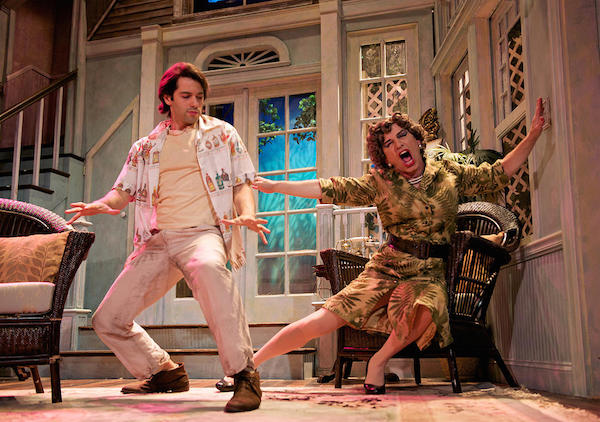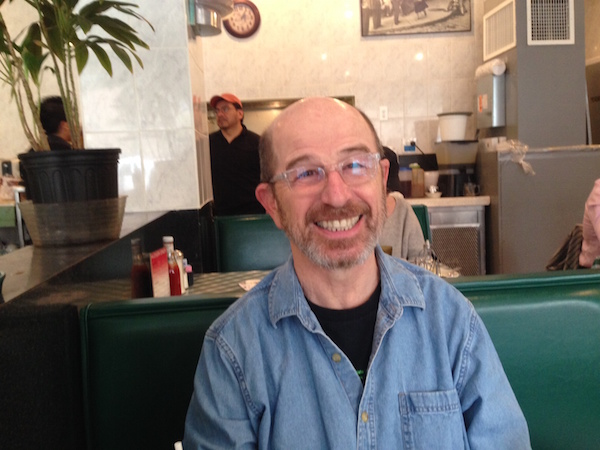
BY DAVID NOH | Everett Quinton, an undoubted New York theatrical treasure and character actor extraordinaire, has had quite the busy year. He was wonderfully on point and true to leering form in “Horseplay,” Trav S.D.’s bio of Adah Isaacs Menken, at La MaMa, starring a luminous Molly Pope. Great reviews came his way for a relatively straight, classical role in Red Bull Theater’s “Tis Pity She’s a Whore.”
Now he stars in the revival of Erasmus Fenn’s campfest, “Drop Dead Perfect,” recreating his role of Idris Seabright, the doyenne of a Key West estate, dealing with shady characters who are after her fortune and mysterious maybe-love interests materializing out of the blue on her picturesque Gothic estate.
Quinton is a longtime neighbor of mine in the West Village, and how well I remember the thrill I’d feel whenever I would see him out strolling with his partner, the late, great playwright and performer Charles Ludlam, whose Ridiculous Theatrical Company was such an integral part of New York cultural life for some three decades.
Meeting Quinton at a favorite haunt of ours, the Hudson Diner, I remarked on how wonderfully busy he’s been and he replied, “I just ran into Kathleen Chalfant, and she said, ‘Isn’t it great? They still want us!’”
Originally from Brooklyn, Quinton is the second of 12 Irish Catholic-born children: “A friend of mine said, ‘We were poor but didn’t know it.’ Well, we were poor and we knew it! My parents didn’t really know up from down and never encouraged me in my acting. Oh, but I remember for my first audition for the Gallery Players in Brooklyn, I was living at home and so nervous. My mother gave me a Valium. She died of a heart attack two years before I really started acting and my father died afterwards of cancer. I had just gotten into [Ludlam’s Wagner spoof] ‘Der Ring Gott Farblonjet’ and my name was listed in the cast in the New York Times. I remember taking that to the hospital and showing it to him.”
“They were stupid to have twelve kids, not really stupid because I have my brothers and sisters, after the fact, and it’s fun. But it was a nightmare, not only never enough money but never any joie de vivre, and unfortunately I’ve inherited that. I have joie de vivre, but I have to remind myself that I have it. In that sense, I am my mother’s son, a Sagittarius. I’m pretty introverted. I know a lot of actors who are outgoing. I’m not, maybe only when I’m with my friends.”
“I always knew I was gay, but didn’t come out until I was twenty-three and decided no more girlfriends. It’s funny because I was sexually active as a kid and used to cruise Prospect Park, still thinking I was the only faggot on earth. It had nothing to do with my being Catholic, I was just a dope [laughs].”
Quinton’s main theatrical education probably came from childhood TV viewings of the famous Million Dollar Movie, which showed vintage features over and over in the course of a week. His favorite film is the wonderfully campy women’s prison opus “Caged.” He cites two of its actresses with particular admiration: Agnes Moorehead (he’s flattered when, while he’s in drag, anyone compares him to her) and Eleanor Parker, whom he considers one of the most underrated performers of our time.

“I never finished school, got a GED. I was at Hunter College, taking some theater classes, like improv. Then, one day, I met Charles Ludlam, cruising Christopher Street old-school style, back in the day when Christopher was the place. That’s why, in front of the Lucille Lortel Theatre, his star on the Playwright Walk of Fame is right there, where we met in a doorway.
“I didn’t see him for six months after that because I lost his phone number. One day, I was walking past a restaurant where McNulty’s now is. He was eating in there and he came out and said hello to me. I still live in our Morton Street apartment.”
What was living with such a fecund theater genius like?
“It was many things. He was always thinking and writing, his mind never stopped. It’s difficult for me because I’m not really a writer. I get these thoughts in my head, but don’t take the action to write, whereas Charles did. Unfortunately, at the end, he actually had two plays going at once, neck and neck in his head, ‘Houdini’ and ‘The Artificial Jungle,’ and we had to get just one play up. Crazy, right?”
Was Ludlam fun?
“When he was fun, he was fun. When he wasn’t, he wasn’t. He didn’t have one of those work ethics — like a certain number of hours a day to write. He was also an actor. He died on May 28, 1987. I observe that day by praying for him in church. I’m Lutheran now, out of the fire back into the frying pan [laughs]! It just happened. The pastor of my church was a friend before I went there. One day, I just decided to go. He was outspokenly gay, and that’s not the opinion of the whole church.
“When [Ludlam] got AIDS, we thought we’d made it through it, because then they talked about an incubation period. If you survived five years, things would be all right. We were coming up on the five years and he went to the dentist, who discovered he had thrush. There was a rapid deterioration after that, which was a blessing because he didn’t want to live sick.”
Ludlam’s death came, ironically, at a time when he seemed to finally be crossing over into the mainstream with film and TV roles: “At his funeral, a filmmaker came up to me and said he had just gotten a callback for another movie and the director said the first audition was so energized, but at the callback he had no energy.”
Ludlam’s funeral was held at St. Joseph’s Church: “[Artist and Stonewall veteran] Thomas Lanigan-Schmidt and Charles were buddies from way back. The priest was a young, decent guy, perhaps gay, and he was going to officiate. Tommy was sitting right next to me, and he saw the vestments the priests were going to wear. He got up and went back into the sacristy, and threw a scene, ‘Do you know who you’re burying today?! Put some better vestments on!’
“That was nice, and then one of the cars broke down on the way to the cemetery and we had to pick up all the people from that car in ours. He’s buried on Long Island in St. Charles Cemetery, in his family plot.”
Quinton does not have a favorite Ludlam play, “but the one I don’t like is ‘Hot Ice,’ about a crime family and cryogenics — they get frozen. It struck me as presumptuous. But with his ‘Galas’ [a spoof of Maria Callas’ life], I got lucky with Bruna [the diva’s faithful, wacky maid and companion] because I did half the work and got all the glory. I got the role because [longtime Ludlam actor] George Osterman decided to leave the Ridiculous Theater while we were rehearsing in Toronto. By then I had proven that I could act.”
Quinton had the ultimate theatrical “aha!” moment in rehearsal for the show.
“We were doing the tea scene when Charles throws a strawberry in the air and catches it. Funny scene. Honest to God, I don’t know where it came from, but I was sitting there, looking at him, and suddenly thought, ‘This fucker will leave you in the dust if you’re not careful.’ And that’s where my whole notion of what acting is came from. I always compare it to a horse race, two horses running neck and neck to the end. Luckily, Charles was very generous and liked to encourage people to keep up with him. You’re always funnier when you’re with funny people.
“I had been acting for seven years by 1983, and Bruna was the first time that I really felt I was a good marksman, firing the shot.”
When Ludlam died, the company went on under Quinton’s direction for another 10 years.
“It was tough because I really don’t have any entrepreneurial ability. Now I’m smarter than I was then and would have done things differently. We certainly had a bunch of hits, like ‘Brother Truckers’ [a spoof of the Warners epic ‘They Drive By Night,’ with Quinton as the shrewish Lila Ballskin], but they just barely paid for themselves, and could never quite get us out of hock.
“The biggest difference for me was I was once the big cheese and now I’m a little cheese and it’s kind of painful. It’s hard to go from starring roles and not feel like a loser. That’s my constant struggle, but every now and then a [role like] Florence Wexler in ‘Devil Boys from Beyond’ or Idris in ‘Drop Dead Perfect’ comes along.”
Although Quinton has an agent, he said, “I can’t get arrested — no film or TV offers. I don’t know why. It makes me sad. I’m prone to self-pity and don’t want to get into that state. The thing is to have gratitude for what I have. Lots of people in the business feel this way, but it’s especially bad for drag queens. For all of the acceptance that has come to us, we are still not considered employable, unless you got a gimmick like Barry Humphries [aka Dame Edna Everage].”
“Drop Dead Perfect” is at Theatre at St. Clements (423 W. 46th St. btw. Ninth & 10th Aves.) through Oct. 11. Mon., Wed. & Thurs. at 7 p.m. Fri. & Sat. at 8 p.m. Sat. & Sun. at 3 p.m. For tickets ($69–99) and more info, visit dropdeadperfect.com.































